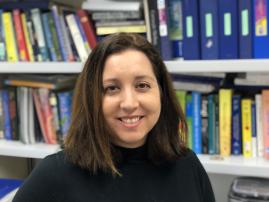
Michelle A. O’Malley is the Cliff R. Scholle Professor of Chemical Engineering at the University of California, Santa Barbara and the Vice Chair of UCSB’s new Bioengineering Department. She earned a B.S. in Chemical Engineering and Biomedical Engineering from Carnegie Mellon University in 2004 and a PhD in Chemical Engineering from the University of Delaware in 2009, where she worked with Prof. Anne Robinson to engineer overproduction of membrane proteins in yeast. O’Malley was a USDA-NIFA postdoctoral fellow in the Department of Biology at MIT. At UCSB, her research group engineers anaerobes and consortia for sustainable chemical production, bioremediation, and natural product discovery. O’Malley’s research has been featured on NPR’s Science Friday, the BBC Newshour, the LA Times, and several other media outlets. She was named one of the 35 Top Innovators Under 35 in the world by MIT Technology Review in 2015, one of the 10 “Scientists to Watch” by Science News in 2019 and is the recipient of the Presidential Early Career Award for Scientists and Engineers (PECASE) – the highest honor bestowed on early career scientists by the US government. She is also the recipient of the Allan P. Colburn Award from the AIChE, the ASM Award for Early Career Applied and Biotechnological Research, the AIChE Division 15 Early Career Award, a DOE Early Career Award, an NSF CAREER award, the Camille Dreyfus Teacher-Scholar Award, the ACS BIOT Division Young Investigator Award, an ACS PMSE Division Young Investigator Award, an ACS WCC “Rising Star” Award, and a Hellman Faculty Fellowship. She was elected to the American Institute of Medical and Biological Engineers in 2020, is the current Chair of the ACS Division of Biochemical Technology (BIOT), and was recently appointed to the U.S. Defense Science Study Group (DSSG).
Research
The O'Malley Lab works at the interface of engineering and biology to engineer microbes and consortia with novel functions. We are especially interested in deciphering how “unwieldy” microbes in the environment perform extraordinary tasks - many of these microbes have no available genomic sequence and are exceptionally difficult to manipulate. We seek a better understanding of how proteins are synthesized by cells, and how their three-dimensional structure informs their function would enhance our ability to engineer proteins (and cellular expression platforms) for diverse biomedical and biotechnology applications. To address these issues, our approach combines classical cell biology tools with cutting-edge technologies (genome sequencing, RNAseq, cellular reprogramming) that are rooted in the core biological sciences to interrogate and engineer molecular mechanisms that underlie protein production in eukaryotic cells. In addition, we rely on biophysical methods to elucidate protein-protein contacts, with the aim of controlling these interactions both in vivo and in vitro. Systems of interest to us have broad applicability to bioenergy and sustainability, as well as to drug development and detection.
For more information please visit http://www.omalleylab.com/
